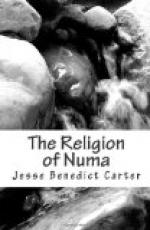The age of formalism had passed, the religious demands of the individual could no longer be satisfied by a mere ritual. For good or for evil something more personal, more subjective, was needed. Men sought for it in various ways and with varying success, but except in the simple forms of family worship old Roman religion was dead.
INDEX
References to the more recent literature on the subject of Roman religion have been given in connection with the appropriate topics in this index.
The following abbreviations have been employed:—R.F. = Warde Fowler, Roman Festivals, London, 1899; R.R. = Wissowa, Religion und Cultus der Roemer, Muenchen, 1902; P.W. = Pauly-Wissowa, Encyclopaedie der Altertumswissenschaft, Stuttgart, 1894—; Lex. = Roscher, Lexikon der Griechischen und Roemischen Mythologie, Leipzig, 1884—.
Actium, 81, 165
Aeneid, as a political treatise, 153
Aesculapius, 84.
Cp. R.R. 253 ff.;
R.F. 278;
Thraemer, P.W. s.v.;
Asklepios
Agricultural character of early Roman religion, 18.
Cp. R.F. 335;
R.R. 20 ff.;
Mommsen, C.I.L. 1, ed. 2, p. 298.
Agrippa, erects Temple of Neptune, 81;
Richter, Topographic der Stadt Rom.
242;
Platner, Ancient Rome, 357
Alba Longa and the Latin League, 52.
Cp. Beloch, Italische Bund,
177;
Huelsen, in P.W. s.v.
Altar of Caesar, 173.
Cp. Huelsen, Forum Romanum,
ed. 2, p. 139;
Platner, Ancient Rome, 180
Animism, 5.
Cp. Tylor, Primitive Culture,
i. 377 ff., ii. 1-327;
Frazer, Golden Bough, i. 170 ff.




